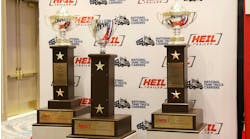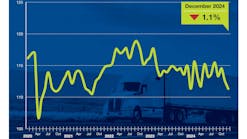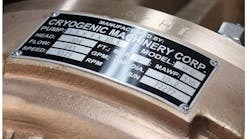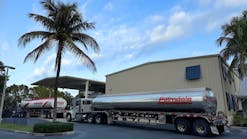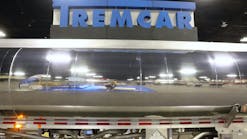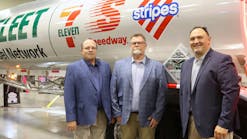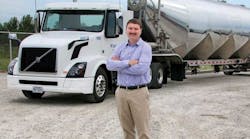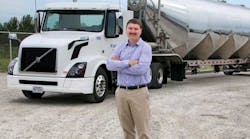Latest from Tank Fleets
BeyondTrucks expands integration hub
PSG acquires cryogenic pump manufacturer
Company fleet helps ensure Mennel Milling’s ability to meet customers’ needs for on-time delivery of flour
AS ONE of the oldest flour millers in the country, The Mennel Milling Company, headquartered in Fostoria, Ohio, has seen a lot of change over more than 130 years. But one thing has remained consistent—family ownership.
D Ford Mennel, CEO of the company, represents the fifth generation of the milling company, which was started in 1886. To put that longevity in perspective, Grover Cleveland was President and the Statue of Liberty was dedicated in New York City.
Its five mills in Ohio, Michigan, Illinois, and Virginia process hard, spring, and soft wheat flours. All told, the company produces more than 200 different types of flour per day, with over 2,000 products in the Mennel Milling catalog.
Flour products from Mennel Milling go to nationally known food companies, as well as independent bakers. Customers also include major mix manufacturers and bakeries that cater to the fast food and restaurant trade.
Transport modes
Distribution is handled through truck and rail shipments, with trucks moving the overwhelming majority of the loads. Mennel Mills uses its own truck and rail fleet to handle 65% of the shipments. The company’s dry bulk transports haul 60% to 70% of the bulk flour loads.
Bulk flour transports typically gross out at 80,000 pounds and deliveries are normally single shipments to one customer—typically to a bakery or mixing plant. Dry bulk trailers also bring wheat from grain elevators to Mennel flour mills and then return to processing plants with “midds”—the portion of a wheat berry that is commonly used for feed ingredients.
“Having our own fleet is important for the Mennel Milling leadership,” says Jeremy Decker, transportation safety manager for Mennel Milling. “We want to provide our customers with very personalized service. We want them to know that our drivers are professionals who know the product and the industry.
“We primarily cover the eastern half of the United States and some of our trucks will make two to three runs per day. We do have longer runs that will take the truck 500 or more miles outside one of our mills. Many of the longer shipments go in our van trailer fleet.
“Our fleet is growing at a slow, steady rate. We’re adding two to three tractors a year.”
Fleet subsidiary
The truck fleet operates under the MMC Transport Inc, a wholly owned subsidiary of Mennel Milling. The fleet is dispersed among many of the company locations. The number of transports at each location can range from two to 30. The largest fleet sites have maintenance shops that also operate under the MMC Transport name. In addition to serving the Mennel Milling fleet, the shops provide commercial truck and trailer maintenance service.
Eight-five percent of drivers return home at the end of a shift. Since all of the bulk fleet tractors are daycabs, the drivers of those tractors over-night in a hotel when they make longer runs.
Dry bulk drivers load and unload their trailers in most cases, but some bulk shipments are pre-loaded and staged at the mills. On the delivery side, drivers offload into a wide range of customer silos.
Loads are dispatched from each fleet location, and routing is a dynamic process. “Some of our customers will know exactly what they need two to three weeks in advance, so those are easier to schedule,” says Decker. “But many others can change their needs daily. It makes it a challenge. We work with BOLT System for our fleet management program, and it helps us tremendously in routing and dispatch.”
Decker says MMC Transport’s maintenance operation was already using maintenance and tracking software from BOLT System. “We were aware of their broader range of products, which were promoted at trade shows,” he says. “We knew they had a dispatch product, and we decided to try it. The BOLT product is a better fit for local and regional activity. BOLT works with fleets that are more like us.
“We had originally gone with the 800-pound gorilla in a fleet management program, but didn’t have success—it was expensive, offered platforms we didn’t need or use, but still paid for. Plus, it wasn’t flexible for our needs. BOLT System has been far less complex. It’s tailored for our needs, and it saves us time and money.”
Since shifting to the BOLT fleet management product, Mennel Milling also has implemented activity-based pay for its drivers—many whom have been with the company for 30 or more years.
“Dispatch and pay were like a jigsaw puzzle without a box top for guidance,” Decker says. “The company pays its drivers in ‘segments,’ with information easily plugged into the company’s PeopleNet electronic driver logging system. In addition, geo-fencing at mills allows for faster input. Pay can be broken out per mile, on longer trips for example, or it can have a flat load rate. Plus loading can have a pay structure, which can include a self-load fee at the mill. What’s more, the time of day can come into play.
“If, for example, a delivery is made after midnight on a Friday, a multiplier can kick in to assign additional value. There are lots of moving parts with our structure. We like how BOLT makes all of this easy for us, and eliminates extra paperwork and tracking on our end. And, our drivers like it too. They see everything and pay is transparent. Plus, they save time every week, because they no longer have to manually record all of their time.”
Fleet specs
Since 2012, Mennel Milling has been buying Mack and Volvo daycabs for bulk flour hauling. The newest tractors have 11-liter engines and 12-speed automated transmissions. Future purchases will include a 6x2 liftable pusher configuration for better fuel economy.
Safety equipment includes Lytx DriveCam video cameras; PeopleNet on-board computers, and Bendix air disc brakes, roll stability, collision avoidance, and lane departure warning. The fleet choice for drive position tires is the Michelin X One widebase.
“We have been spec’ing air disc brakes on tractors—and trailers—since 2012,” Decker says.
Recent dry bulk trailer purchases have come from Stephens Pneumatics Inc. Trailers are specified with a full package of BTI hardware including butterfly valves, aerators, and tees. Knappco domelids also are standard equipment.
The fleet runs both Meritor axles with Meritor Tire Inflation by PSI and a Ridewell lift axle and Hendrickson’s Intraax axle/air suspension system with a forward lifting axle and Tiremaax tire inflation. “Since half our miles are empty, we can reduce our parasitic drag by lifting one axle when we’re not loaded,” Decker says. “Plus we’ll save some tire wear.”
Pneumatic trailer capacities range from 1,550 to 2,000 cubic feet. According Decker, more dense loads, like bread flour, can be shipped in the 1,550 cu ft trailers, where as ‘cake’ flour is lighter, or less dense, and can fill a 2,000 cu ft pneumatic trailer.
Mennel also runs a significant number of van trailers for packaged 50-pound bags of flour, up to Super Sacks—1,600 pound totes. “We’re seeing more demand for packaged shipments to both small and large bakeries,” Decker says. “We have added more van trailers to our fleet to meet this demand, and many of these shipments are longer hauls that keep our drivers on the road multiple days.” ♦
